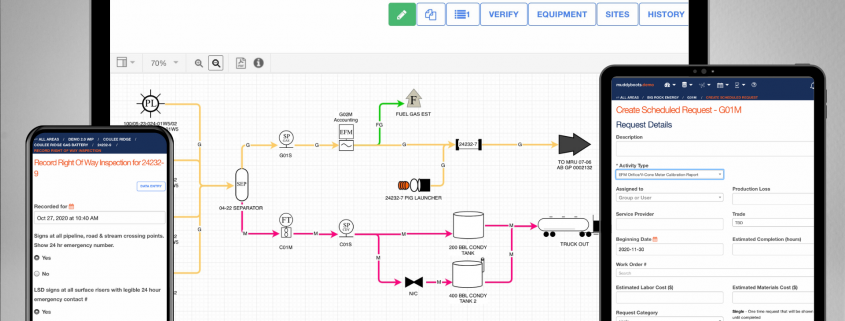One Stop Shop – Where does technology go next
One Stop Shop – Where does technology go next
A conversation with industry about the future of operations and how new technology can help.
Q: Why do you see One Stop shop as the way of the future? Why is it worth investing in?
A1: Everyone is moving in this direction – service companies are offering suites of software to augment their services. Data has become more than just a buzzword, we currently have multiple redundant databases that are becoming a strain to manage. Streamlining everything into one database will mean less time spent updating, training and purchasing new software.
A2: One stop shop comes down to one thing – Efficiency. We can maintain one asset list with only one data entry point (low admin time for operators and primary administrators). With the on-going fluctuation in the market, finding ways to be more efficient is our only path.
A3: Its not, I don’t see one stop shop as feasible, there are too many different use cases to be neatly tied up in one program. That said, linking all the databases together will allow us to achieve the efficiencies we need.
Q: What are the biggest issues you face as an operations manager? How would a one stop shop help you solve these issues?
A1: Right now, the regulatory side is always getting bigger and more complex. It’s become almost a fly by the seat of your pants endeavor – hoping you’re not negligent but it’s too big to hold all in your head. Properly set up software allows you to see what’s being missed – and when you’re always looking in one spot you don’t miss things.
Another thing that strains my time is cost tracking – I am trying to predict the future. Combining the predicted costs against the actual would provide me a way collect valuable data and make better predictions in the future.
A2: My biggest concern as an operations manager is that I waste too much time on admin and documentation. So, it really comes back to efficiency. I need to be able to do more with less and keep the same results.
A3: One of my biggest struggles as an operations manager is time for proper deployment. There seem to be many conflicting departments, all fighting for their benefit. This comes at the detriment to proper deployment, they are looking for a silver bullet and not willing to go the whole way to incorporate the software into the company as a whole.
Q: Are you seeing solutions available to meet those needs?
A1: Things are getting there. I’d love to see a map interface that allows me to click the inspections and activity that needs to be done or leave a note at a specified location.
A2: Nothing out there does it all and those that exist still have work to do to bring them up to speed.
A3: No – I don’t see anything available at the moment. Maybe with connections between software in the future. But I don’t see everything ever fitting together in one piece of software
Q: In an ideal world what would One Stop Shopping accomplish for your company?
A1: Having a One Stop Shop would free up more resources, with less time required for training and maintaining data. Additionally, having everything in one place will help us identify issues sooner and see ongoing trends.
A2: Increased Efficiency.
A3: We’re trying to move past the one stop shop idea to AI. This way we can inform our maintenance schedule and save money on our Maintenance program.
Q: What would you do if you had an hour of time freed up in your work day?
A1: More of the same, I’d check in with the field more regularly, keep the service companies on track, ensure safety where it’s supposed to be and be the management presence.
A2: Well I see this helping everyone so it depends on their role, E&I or Maintenance individuals will be out getting work down, analyzing the whole program to make it better. Operators will have get more work done and eventually you’ll need less operators to do the same work. Bottom line, an extra hour will help you make a difference and lower the bottom line for the company. After all, a job done in less time makes dollars for the company.
A3: I’d spend my time focused on improving maintenance strategies and tactics.
Q: What is your Operations Mantra? Planned precision, Focus on the exceptions, Put out the fires as they come?
A1: We are focused on growth, so we have a simple strategy. Do it right the first time. Keep regularly scheduled items moving in the right direction. This allows us to keep downtime and incidents to a minimum. In the increasing regulatory environment, I need to see the whole plan from and Maintenance and a regulatory perspective.
A2: We are moving towards planned precision with a weekly schedule to keep it all together.
Step 1: Ensure what you need to get done is getting done and documented
Step 2: Analyze and understand what you can change. Make those moves towards optimization
We have an annual meeting to discuss things we can change. Moving past the status quo to what is better. We’ve been able to make those changes over the years by using our electronic documentation and trends to back up our choices.
A3: We are already in the category of Operations by exception, predictive strategies and monitoring. No longer on time intervals but relying on sample results and conditional alarming.
For example, we are focusing on field compression and oil filters. This represents huge savings for the company as it is a strain on man power and affects available production hours. By tracking all the details that makes each compressor unique (Runhours, weather, oil filter differential monitoring, vibration, swabs and oil samples) we now only shut down when we need to, not because it’s been 3 months.
Q: What’s next in operations?
A1: We will keep heading to more automation, more wells under each operator, sites with entirely remote operation, operators are only going to show up to fix things.
A2: Hmm, I’ve never really thought about the future – but it will definitely be a change from the past.
Whatever solution is put forward, must continue to be more efficient. I see AI analysis playing a big role. Finding and exposing the details to make the whole operation more efficient, what is wrong and needs attention the quickest.
A3: Our company sees the future of operations in AI. We have already started integrating pump off tickets etc… into our field automation to help us define maintenance. This will continue to include more of our maintenance activities and help us optimize our field schedule.
The world continues to change, both subtly overtime and drastically as we all experienced with the recent COVID-19, technology will play an increasingly critical role. Muddy Boots is excited to be a part of these changes.



